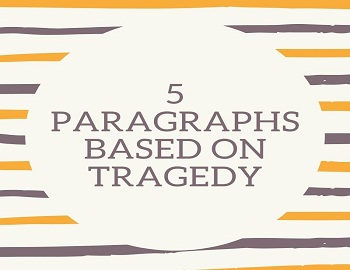Table of Contents
Story Writing:
Story-writing is a useful art that delights both the young and the old. It is a form of composition that is at once instructive and interesting. The art of writing a good short story comes from practice. A matriculation student is generally required-
(1) To write a story from the given outlines.
(2) To complete an incomplete story.
(3) To write a story to illustrate a proverb.
A good short story is written in an easy, natural and forceful way. It gives us a peep into real life. It describes events in such a way that they appear true to life. It avoids repetitions as also gaps and is a readable and connected piece of narrative.
Writing a Story from a Given Outline:
The following points should be remembered in this connection-
(1) Read the outline of the story carefully and form a clear idea of it in your mind.
(2) Supply a suitable heading or title to the story. It may be the name of an important character, an incident, a proverb or a well-known quotation.
(3) Develop the points carefully adding suitable details. Here the writer will have full scope for his powers of imagination and invention.
(4) Connect the points in a logical and natural order to make a continuous narrative.
(5) Write the story in a clear, simple and forceful way.
(6) Introduce dialogue or conversation to make the story interesting. In case you are unable to manage the Indirect form of narration, use the Direct form.
(7) Avoid repetitions and gaps.
(8) Try to bring out the point of the story but avoid moralizing. No moral should be given unless it is asked.
(9) See that the beginning and the end of the story are natural and striking. Do not write anything irrelevant in the story.
(10) Write the story in the past tense even if the outline is given in the present.
Some Illustrative Example:
(1) Outline: A hare proud of swiftness—mocks tortoise for slowness—challenges to a race—fox umpire—hare sure to win—runs swiftly—treats the matter lightly—takes a nap—sleeps too long—the tortoise continues moving steadily—passes by the hare—the hare gets up—runs hard—finds the tortoise at the winning post—moral.
Complete Story: The Hare and the Tortoise
Once a hare was proud of his speed as a runner. He mocked the tortoise for his slow speed saying, “How slow you are!” The tortoise felt angry and said, “No doubt you can run very fast, but I think I can beat you in a race.” “Ha, ha, ha!” laughed the hare, “You to run a race with me! I gladly accept your challenge.”
A fox was made the judge and a distant tree the winning post. The race began early in the morning the next day.
The fox said, “One, two, three,” and away they went. The hare ran very fast and was soon out of sight. The hare was sure of his success. When he reached a shady tree, he thought he could have a nap. He lay there and was soon fast asleep.
The tortoise, on the other hand, went on moving slowly and steadily. He saw the hare sleeping but did not stop there.
When the hare woke up, the tortoise was already near the winning post. The former ran to the goal as fast as he could. He was surprised and ashamed to find the tortoise already there.
Moral: (a) Slow and steady wins the race. (b) Pride hath a fall.
(2) Outline: Three men pass through a jungle—find a purse containing money—each becomes too greedy—one is sent to fetch food—greediness—poisons the food bought and the other two plot to murder him—returns—is murdered by his companions—they eat the poisoned food—conclusion.
Complete Story: Three Greedy Companions
One day fast friends set out on a journey. Their way lay through a jungle. They had not gone far when luckily they came by a purse full of money. They were beside themselves with joy.
But all the three friends were very greedy. Each wished to get the lion’s share. In the heart of their hearts, they thought of many a plan.
They sat under a shady tree and felt hungry. One of them went to the city to fetch food. He did full justice to dainty dishes and sweets all alone. He also bought some food for his companions, but an evil thought came to him. He mixed poison in the food.
In the absence of their companion, the other two put their heads together and agreed to do away with his life. They prepared syrup and mixed poison in it. They planned to offer it to their companion as soon as he would come back from the city.
At last, their companion returned with the poisoned food. He was offered the poisoned syrup. He died as soon as he took it. The remaining two partook of the poisoned food and breathed their last.
Moral: Greediness is a curse.
(3) Outline: An elephant daily goes to a tank—passes through a bazaar—a tailor’s shop on the way—becomes friendly with tailor—tailor gives him something to eat—one day tailor sitting angry—pricks elephant’s trunk with a needle—elephant brings mud in its trunk from the tank and throws it in tailor’s shop—clothes spoiled—moral.
Complete Story: The Tailor and the Elephant
Once an elephant used to go to a tank daily. It bathed in the tank. It passed through a bazaar of the town. People were glad to see the elephant going to the tank and returning from there. There was a tailor’s shop in the bazaar. The tailor was very gentle. One day he offered some fruit to the elephant. The elephant gladly ate the fruit. The next day again the tailor gave the elephant something to eat. In this way the elephant and the tailor became friends. Daily the elephant put his trunk in the tailor’s shop and the tailor would put something in that.
One day the tailor had quarrelled with a customer and was sitting in an angry mood. The elephant came and put his trunk in his shop. The tailor did not give him anything but pricked the trunk with his needle. The elephant went away to the tank. It filled its trunk with mud and water and returned. It stopped at the tailor’s shop, put its trunk in the shop and poured all the mud and water there. The clothes the tailor was making were spoiled. Thus the tailor was punished for his mischief.
Moral: Tit for Tat.
(4) Outline: A fox falls into a well—can’t get out—a foolish goat peeps down in the well—climbs down to drink sweet water—fox climbs on goat’s back and jumps out—leaves the goat in the well—Moral.
Complete Story: The Clever Fox
Once a fox and a goat lived in a forest. It so happened that the fox fell into a well. The well was very deep. The poor fox could not get out of it. It thought it would die if Providence did not come to its rescue. By chance, the goat passed the way. It saw the fox fall in the well. It said to the fox, “What are you doing there in deep water?” The fox was very cunning. It replied, “I am drinking water. The water of this well is very sweet. How I like to be always here! Climb down, if you like to have a drink.” The foolish goat at once agreed and jumped into the well. As soon as it jumped, the fox climbed on its back and jumped out of the well. The fox by this trick, saved itself, leaving the poor goat to its fate.
Moral: Look before you Leap.
(5) Outline: A donkey carrying a load of salt—fell by chance in a stream—salt dissolved—load became lighter—his master loaded him with sponges to punish him—the donkey sat in the stream—sponge filled with water—result.
Complete Story: The Dokey carrying a Load of Salt
Once a donkey was carrying a load of salt. The load was heavy. There was a stream on the way. As the donkey was crossing it, by chance he fell down. The salt was dissolved in water and the load became lighter. The donkey now every day sat in the stream in order to lighten his load. The master wanted to punish him. So he, one day, loaded the donkey with sponges. As usual, the donkey was crossing the stream. When he was in the middle of the stream, he sat down. The sponges were filled with water. The load became very heavy. The master beat the donkey hard to make him stand. The poor donkey could hardly stand on his legs, but he had to carry the load. With great difficulty, he carried the load out of the stream. It was a good punishment for him. From that day he never sat in the stream.
Moral: Cleverness does not pay always.
(6) Outline: A tiger old and weak—incapable of hunting—sits near a pool—a traveller passes—tiger shows him a gold bangle—poses to be pious and offers the bangle—greedy traveller befooled—wants to get the bangle for his wife—sticks in the mud—eaten.
Complete Story: The Tiger with a Bangle
A tiger had grown old and weak. It was incapable of hunting because it could not run fast. It lay hungry for many days. At last, it sat near a pool. It was a muddy pool and the water was shallow.
All-day long the tiger sat waiting for some prey to pass that way. In the evening a traveller chanced to pass along the other bank of the pool. The tiger called him aloud and said, “Goodman, come this way. I have a gold bangle. It is of no use to me and I shall give it to you.” The traveller said “I am afraid of you. I cannot come to you lest you should devour me up.” The lion said, “You are mistaken. I have given up the habit of eating men. In old age, I have grown pious. Here is the gold bangle which I got by killing a young woman. Now I am repenting of my evil deed. I wish to give this bangle by way of charity. If you do not accept this bangle, I shall give it to some other passer-by.” The traveller was very greedy. He walked towards the lion to receive the gold bangle. As soon as he put his foot in the pool, he got stuck in the mud. The lion said, “Don’t fear, I come to rescue you”. The lion came near, jumped upon the traveller, killed him and made a good meal. This was the end of the greedy traveller. The moral is that Greediness is a curse.
Moral: Greediness is a curse.
(7) Outline: Traveller with two horses, one with a long tail, other with a short tail—an inn—charged four annas more for food of longer-tailed—why?—long-tailed can keep off flies with tail while eating—eats more—other drives away flies with head—eats less.
Complete Story: The Long-tailed and the Short-tailed Horses
Once a traveller had two horses. The tail of one was long while that of the other was short. He was travelling from place to place to sell his horses. One night he stayed in an inn. The innkeeper put fodder before the horses and in the end brought the bill. The traveller saw that in the bill the cost of the fodder for one horse was more than for the other. He thought it was a mistake and asked the innkeeper to correct it. The innkeeper told him that it was correct. The innkeeper said, “Both the horses cannot eat at the same rate. The one with a long tail eats more because as it is eating, it can keep off flies with its tail. The other has a short tail and it keeps off flies with its head. So while eating, it moves its head this way and that way; so it eats less”. The traveller was pleased with the reply of the innkeeper and paid his bill.
(8) Outline: A hot day—a cap-seller under a tree—ten red caps for sale—falls asleep—caps gone when he wakes—ten monkeys on the tree—each wears a cap— think how to get back caps—snatches cap off his head and throws it down—monkeys imitate.
Complete Story: The Cap-Seller and the Monkeys
Once a cap-seller was on tour. He was passing through a jungle. The day was very hot. He sat down under the shade of a tree. By his side, he placed a bundle containing caps. He was tired and footsore and could not go further. So he thought of lying down for a short while. As soon as he lay down, the cold breeze lulled him to sleep. After about an hour’s sleep, he woke. To his great astonishment, the caps were all gone. He looked hither and thither. He wondered and wondered. At last, he looked up and saw monkeys on the branches of the tree. They were wearing caps. Now the question was how to get back the caps. He was afraid of the monkeys. He thought and thought. All of a sudden it came into his head that monkeys are fond of imitating others actions. He had a cap on his head. He made some noise and when all the monkeys were attentive, he put off his own cap and threw it on the ground. All the monkeys put off their caps and threw them on the ground one after the other. The merchant was much pleased with it, collected the caps and took his way.
Moral: Clever thinking can easily solve a problem.









Comments (No)